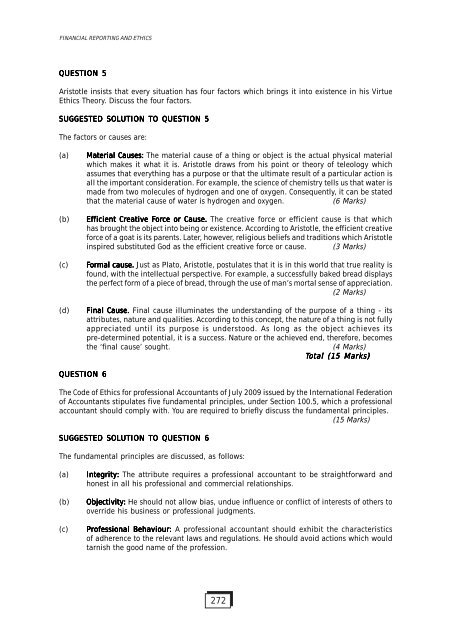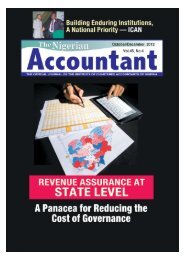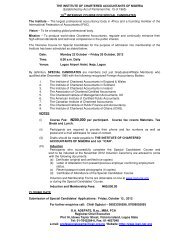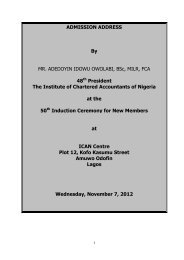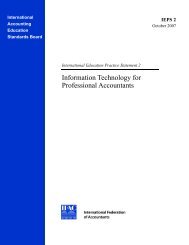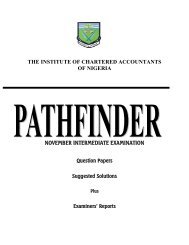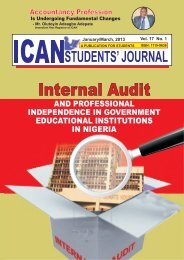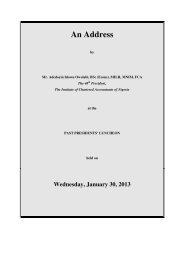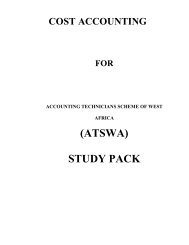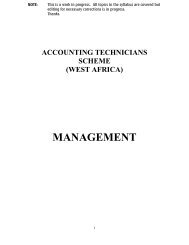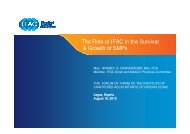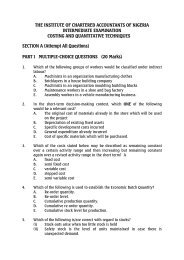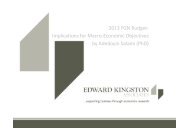- Page 4:
FINANCIAL REPORTING AND ETHICS1.3.3
- Page 11 and 12:
ACCOUNTING AND REPORTING POLICIESsu
- Page 13 and 14:
ACCOUNTING AND REPORTING POLICIES(j
- Page 15 and 16:
ACCOUNTING AND REPORTING POLICIES(i
- Page 17 and 18:
ACCOUNTING AND REPORTING POLICIES2.
- Page 19 and 20:
3AMALGAMATION, ABSORPTION ANDRECONS
- Page 21 and 22:
AMALGAMATION, ABSORPTION AND RECONS
- Page 23 and 24:
AMALGAMATION, ABSORPTION AND RECONS
- Page 25 and 26:
AMALGAMATION, ABSORPTION AND RECONS
- Page 27 and 28:
AMALGAMATION, ABSORPTION AND RECONS
- Page 29 and 30:
AMALGAMATION, ABSORPTION AND RECONS
- Page 31 and 32:
AMALGAMATION, ABSORPTION AND RECONS
- Page 33 and 34:
AMALGAMATION, ABSORPTION AND RECONS
- Page 35 and 36:
AMALGAMATION, ABSORPTION AND RECONS
- Page 37 and 38:
AMALGAMATION, ABSORPTION AND RECONS
- Page 39 and 40:
AMALGAMATION, ABSORPTION AND RECONS
- Page 41 and 42:
AMALGAMATION, ABSORPTION AND RECONS
- Page 43 and 44:
AMALGAMATION, ABSORPTION AND RECONS
- Page 45 and 46:
AMALGAMATION, ABSORPTION AND RECONS
- Page 47 and 48:
AMALGAMATION, ABSORPTION AND RECONS
- Page 49 and 50:
AMALGAMATION, ABSORPTION AND RECONS
- Page 51 and 52:
AMALGAMATION, ABSORPTION AND RECONS
- Page 53 and 54:
AMALGAMATION, ABSORPTION AND RECONS
- Page 55 and 56:
AMALGAMATION, ABSORPTION AND RECONS
- Page 57 and 58:
AMALGAMATION, ABSORPTION AND RECONS
- Page 59 and 60:
AMALGAMATION, ABSORPTION AND RECONS
- Page 61 and 62:
AMALGAMATION, ABSORPTION AND RECONS
- Page 63 and 64:
AMALGAMATION, ABSORPTION AND RECONS
- Page 65 and 66:
AMALGAMATION, ABSORPTION AND RECONS
- Page 67 and 68:
4ANALYSIS AND INTERPRETATION TION O
- Page 69 and 70:
ANALYSIS AND INTERPRETATION OF FINA
- Page 71 and 72:
ANALYSIS AND INTERPRETATION OF FINA
- Page 73 and 74:
ANALYSIS AND INTERPRETATION OF FINA
- Page 75 and 76:
ANALYSIS AND INTERPRETATION OF FINA
- Page 77 and 78:
ANALYSIS AND INTERPRETATION OF FINA
- Page 79 and 80:
ANALYSIS AND INTERPRETATION OF FINA
- Page 81 and 82:
ANALYSIS AND INTERPRETATION OF FINA
- Page 83 and 84:
ANALYSIS AND INTERPRETATION OF FINA
- Page 85 and 86:
ANALYSIS AND INTERPRETATION OF FINA
- Page 87 and 88:
ANALYSIS AND INTERPRETATION OF FINA
- Page 89 and 90:
5ACCOUNTING STANDARDS5.0 LEARNING O
- Page 91 and 92:
ACCOUNTING STANDARDS(i)(ii)(iii)(iv
- Page 93 and 94:
ACCOUNTING STANDARDSThere is no SAS
- Page 95 and 96:
ACCOUNTING STANDARDS5.2.4 Borrowing
- Page 97 and 98:
ACCOUNTING STANDARDS(iii)Certain pe
- Page 99 and 100:
ACCOUNTING STANDARDSby venture capi
- Page 101 and 102:
ACCOUNTING STANDARDSIFRS 7 Financia
- Page 103 and 104:
ACCOUNTING STANDARDSactivity, non-c
- Page 105 and 106:
ACCOUNTING STANDARDSin the year inc
- Page 107 and 108:
ACCOUNTING STANDARDS(v)(vi)(vii)whe
- Page 109 and 110:
ACCOUNTING STANDARDS(v)Actions requ
- Page 111 and 112:
ACCOUNTING STANDARDSAccounting stud
- Page 113 and 114:
6ETHICAL FRAMEWORK, CONCEPTSAND VAL
- Page 115 and 116:
ETHICAL FRAMEWORK, CONCEPTS AND VAL
- Page 117 and 118:
ETHICAL FRAMEWORK, CONCEPTS AND VAL
- Page 119 and 120:
ETHICAL FRAMEWORK, CONCEPTS AND VAL
- Page 121 and 122:
ETHICAL FRAMEWORK, CONCEPTS AND VAL
- Page 123 and 124:
ETHICAL FRAMEWORK, CONCEPTS AND VAL
- Page 125 and 126:
ETHICAL FRAMEWORK, CONCEPTS AND VAL
- Page 127 and 128:
ETHICAL FRAMEWORK, CONCEPTS AND VAL
- Page 129 and 130:
ETHICAL FRAMEWORK, CONCEPTS AND VAL
- Page 131 and 132:
ETHICAL FRAMEWORK, CONCEPTS AND VAL
- Page 133 and 134:
ETHICAL FRAMEWORK, CONCEPTS AND VAL
- Page 135 and 136:
ETHICAL FRAMEWORK, CONCEPTS AND VAL
- Page 137 and 138:
ETHICAL FRAMEWORK, CONCEPTS AND VAL
- Page 139 and 140:
ETHICAL FRAMEWORK, CONCEPTS AND VAL
- Page 141 and 142:
ETHICAL FRAMEWORK, CONCEPTS AND VAL
- Page 143 and 144:
ETHICAL FRAMEWORK, CONCEPTS AND VAL
- Page 145 and 146:
ETHICAL FRAMEWORK, CONCEPTS AND VAL
- Page 147 and 148:
7THE ENVIRONMENT: CORPORATE,PROFESS
- Page 149 and 150:
THE ENVIRONMENT: CORPORATE, PROFESS
- Page 151 and 152:
THE ENVIRONMENT: CORPORATE, PROFESS
- Page 153 and 154:
THE ENVIRONMENT: CORPORATE, PROFESS
- Page 155 and 156:
THE ENVIRONMENT: CORPORATE, PROFESS
- Page 157 and 158:
THE ENVIRONMENT: CORPORATE, PROFESS
- Page 159 and 160:
THE ENVIRONMENT: CORPORATE, PROFESS
- Page 161 and 162:
THE ENVIRONMENT: CORPORATE, PROFESS
- Page 163 and 164:
THE ENVIRONMENT: CORPORATE, PROFESS
- Page 165 and 166:
THE ENVIRONMENT: CORPORATE, PROFESS
- Page 167 and 168:
THE ENVIRONMENT: CORPORATE, PROFESS
- Page 169 and 170:
THE ENVIRONMENT: CORPORATE, PROFESS
- Page 171 and 172:
8PROFESSIONAL ETHICS8. 0 LEARNING O
- Page 173 and 174:
PROFESSIONAL ETHICSobjectivity are
- Page 175 and 176:
PROFESSIONAL ETHICS(c)(d)The type o
- Page 177 and 178:
PROFESSIONAL ETHICSabout conflicts
- Page 179 and 180:
PROFESSIONAL ETHICS(d)(e)Confidenti
- Page 181 and 182:
PROFESSIONAL ETHICSA. III onlyB. II
- Page 183 and 184:
9DECISION MAKING IN ETHICS9. 0 LEAR
- Page 185 and 186:
DECISION MAKING IN ETHICS9.2 A FRAM
- Page 187 and 188:
ETHICAL THREATS AND SAFEGUARDS(d)We
- Page 189 and 190:
DECISION MAKING IN ETHICS4. A perso
- Page 191 and 192:
10ETHICAL THREATS TS AND SAFEGUARDS
- Page 193 and 194:
ETHICAL THREATS AND SAFEGUARDS(iv)(
- Page 195 and 196:
ETHICAL THREATS AND SAFEGUARDSto th
- Page 197 and 198:
ETHICAL THREATS AND SAFEGUARDSpayab
- Page 199 and 200:
ETHICAL THREATS AND SAFEGUARDS(a)Fi
- Page 201 and 202:
ETHICAL THREATS AND SAFEGUARDSimmin
- Page 203 and 204:
ETHICAL THREATS AND SAFEGUARDSHowev
- Page 205 and 206:
ETHICAL THREATS AND SAFEGUARDS(iii)
- Page 207 and 208:
11CORPORATE GOVERNANCE11.0 LEARNING
- Page 209 and 210:
CORPORATE GOVERNANCE11.3.1 Nature(a
- Page 211 and 212:
CORPORATE GOVERNANCEThe company sho
- Page 213 and 214:
CORPORATE GOVERNANCEtrust, possible
- Page 215 and 216:
CORPORATE GOVERNANCEAn agent has im
- Page 217 and 218:
CORPORATE GOVERNANCE(a)(b)(c)(d)(e)
- Page 219 and 220:
CORPORATE GOVERNANCE11.6.1 The law
- Page 221 and 222: CORPORATE GOVERNANCEILLUSTRAUSTRATI
- Page 223 and 224: CORPORATE GOVERNANCEimitated. They
- Page 225 and 226: CORPORATE GOVERNANCE(a)(b)Greenbury
- Page 227 and 228: CORPORATE GOVERNANCE11.9.2 Boards d
- Page 229 and 230: CORPORATE GOVERNANCErelationship wi
- Page 231 and 232: CORPORATE GOVERNANCE(e)(f)(g)(h)(i)
- Page 233 and 234: CORPORATE GOVERNANCE(vi)Inquisitive
- Page 235 and 236: CORPORATE GOVERNANCE(e)ConsultancyA
- Page 237 and 238: CORPORATE GOVERNANCEThe incoming au
- Page 239 and 240: CORPORATE GOVERNANCEIn summary, acc
- Page 241 and 242: CORPORATE GOVERNANCEAccording to Th
- Page 243 and 244: CORPORATE GOVERNANCE3. A body corpo
- Page 245 and 246: 12SOCIAL AND ENVIRONMENTALISSUES IN
- Page 247 and 248: SOCIAL AND ENVIRONMENTAL ISSUES IN
- Page 249 and 250: SOCIAL AND ENVIRONMENTAL ISSUES IN
- Page 251 and 252: SOCIAL AND ENVIRONMENTAL ISSUES IN
- Page 253 and 254: SOCIAL AND ENVIRONMENTAL ISSUES IN
- Page 255 and 256: SOCIAL AND ENVIRONMENTAL ISSUES IN
- Page 257 and 258: SOCIAL AND ENVIRONMENTAL ISSUES IN
- Page 259 and 260: SOCIAL AND ENVIRONMENTAL ISSUES IN
- Page 261 and 262: SOCIAL AND ENVIRONMENTAL ISSUES IN
- Page 263 and 264: APPENDIX ISUGGESTED SOLUTIONS TO RE
- Page 265 and 266: SUGGESTED SOLUTIONS TO REVISION QUE
- Page 267 and 268: SUGGESTED SOLUTIONS TO REVISION QUE
- Page 269 and 270: APPENDIX IICOMPREHENSIVE QUESTIONS
- Page 271: COMPREHENSIVE QUESTIONS AND SUGGEST
- Page 275 and 276: COMPREHENSIVE QUESTIONS AND SUGGEST
- Page 277 and 278: APPENDIX IIICASE STUDY 1Karsashi, a
- Page 279 and 280: CASE STUDIES(iii)(iv)The floor sale
- Page 281 and 282: CASE STUDIESShare price and dividen
- Page 283 and 284: CASE STUDIESSUGGESTED SOLUTION(A) A
- Page 285 and 286: CASE STUDY 3The following informati
- Page 287 and 288: CASE STUDIESCASE STUDY 4Ologobojo i
- Page 289 and 290: APPENDIX IVTable 1:SUMMARY OF INTER
- Page 291 and 292: SUMMARY OF INTERNATIONAL ACCOUNTING
- Page 293 and 294: APPENDIX VGLOSSARY OF TERMSAbsorpti
- Page 295 and 296: GLOSSARY OF TERMSEthical Objectivis
- Page 297 and 298: APPENDIX VIBIBLIOGRAPHYChambers Ham
- Page 299 and 300: APPENDIX VIISTUDY AND EXAMINATION T
- Page 301 and 302: STUDY AND EXAMINATION TECHNIQUES7.3
- Page 303 and 304: INDEXAAbsorption, 17, 19, 39, 40, 4
- Page 305 and 306: INDEXProfessional Behaviour, 136, 1
- Page 307 and 308: 307
- Page 309: 309


